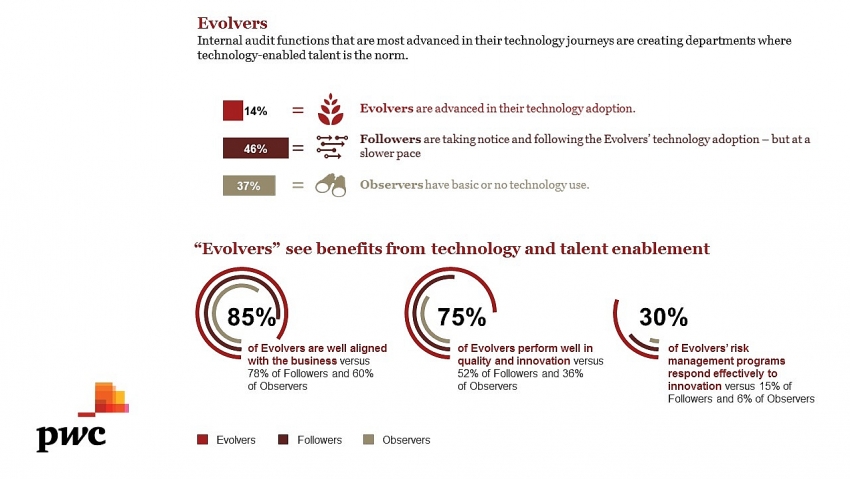PwC: Investing in internal audit innovation to enhance business value
 Organisations are not doing enough to protect data privacy: PwC Organisations are not doing enough to protect data privacy: PwC |
 PwC beefs up security for rising threat of cybercrime PwC beefs up security for rising threat of cybercrime |
As the pace of innovation continues to accelerate, internal auditors face the growing challenge of helping their organisations ensure effective processes and controls while helping to drive the growth of their businesses.
A new study from PwC, titled “Moving at the speed of innovation: The foundational tools and talents of technology-enabled internal audit,” reveals that more advanced internal audit functions are creating departments with a cohesive technology and talent strategy.
Surveying more than 2,500 board members, senior executives, and audit professionals across 92 countries, PwC’s State of the Internal Audit Profession report shows that 75 per cent of Internal Audit teams who have a strong technology- and talent-enabled strategy in place are contributing significant value to their organisations, compared to only 34 per cent of teams, which are lacking in advanced technology strategy and skill sets.
“Technology advancements are evolving quickly and organisations are developing tomorrow’s innovations faster than ever before. However, these tools present new risks and leading Internal Audit functions must provide a unique perspective around them early in the technology innovation cycle,” said Jason Pett, leader of PwC’s US Internal Audit, Compliance and Risk Management practice. “The most successful internal audit organisations are not only prepared to help mitigate the risk of these advanced technologies, but are leveraging the very same tools to execute their work in a more effective manner.”
 |
| PwC: Investing in internal audit innovation to enhance business value |
According to PwC’s survey, only 14 per cent of internal audit functions are advanced in their technology adoption (known as “Evolvers”). Surprisingly, Evolvers are not just found in large organisations or in regulated industries.
They span industries, company sizes, and geographies, suggesting that organisations can overcome stereotypical technology barriers of budget and size. While Evolvers are a small group, they set the example: nearly half (46 per cent) of internal audit functions are following Evolvers’ technology adoption, but at a slower pace (“Followers”). The remaining 37 per cent of Internal Audit functions lag in technology adoption and are considered “Observers.”
Lauren Massey, principal within PwC’s US Internal Audit, Compliance and Risk Management practice, said, “In order to keep pace with their organisation’s innovation agenda, internal audit needs a strong technology and talent strategy to push the boundaries of their own innovation.”
“Internal audit could have the best innovation plan, but will not be able to execute without the right reinforcements. The combination of technology and talent is the key to accelerating progress,” added Massey.
| Highlights of Evolver characteristics which make these top-performing internal audit functions stand out
|
What the stars mean:
★ Poor ★ ★ Promising ★★★ Good ★★★★ Very good ★★★★★ Exceptional
 Tag:
Tag:
Related Contents
Latest News
More News
- Shopee and TikTok Shop account for 8 per cent of Vietnam’s retail market (January 16, 2026 | 00:00)
- Human-centred governance seen as key to AI development (December 19, 2025 | 18:19)
- TECHFEST Vietnam 2025 links startups with policy and capital (December 15, 2025 | 18:21)
- Long Thanh International Airport welcomes first Vietnam Airlines test flight (December 15, 2025 | 18:01)
- Foreign fruits flood Vietnamese market (December 09, 2025 | 13:22)
- Vietnam’s fruit and vegetable exports reach $7.8 billion in first 11 months (December 05, 2025 | 13:50)
- Vietnam shapes next-generation carbon market (November 26, 2025 | 15:33)
- PM urges Ho Chi Minh City to innovate and remain Vietnam’s economic locomotive (November 26, 2025 | 15:29)
- Experts chart Vietnam's digital finance path: high hopes, high stakes (November 14, 2025 | 10:56)
- Vietnam’s seafood imports surge 30 per cent in first 10 months (November 10, 2025 | 19:35)






















 Mobile Version
Mobile Version